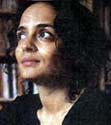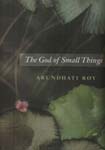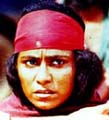The Rediff Special /Vir Sanghvi
'Why would anyone abroad be interested in the book? I am not
very well educated. So it's not as though I am like Salman
Rushdie or Vikram Seth'
 Arundhati Roy is the latest Indian writer to make international headlines.
Her The God Of Small Things has earned the Delhi actress (Massey
Sahib)-turned-aerobics instructor-turned-writer an advance of Rs 35 million from
her publishers, considerably more than what Vikram Seth earned for A Suitable
Boy. Sunday magazine editor Vir Sanghvi
met Roy recently to discuss her first novel:
Arundhati Roy is the latest Indian writer to make international headlines.
Her The God Of Small Things has earned the Delhi actress (Massey
Sahib)-turned-aerobics instructor-turned-writer an advance of Rs 35 million from
her publishers, considerably more than what Vikram Seth earned for A Suitable
Boy. Sunday magazine editor Vir Sanghvi
met Roy recently to discuss her first novel:
Six years ago, Arundhati Roy decided to write a book. Her reasons
were simple enough. She had just finished work on the film Electric
Moon- - ''Not a very happy experience'' -- and though she was supposed
to write another script for Channel Four, she wanted to do something
that was more private.
''The real reason was also that I had just got a computer and I
like the idea of writing on it,'' she admits. ''So, I just started
putting down what was going on in my head. It was a very private
thing. I wouldn't show what I had written to anybody. It would
just stay in the computer. It was all just coming out of me, like
smoke I suppose, and I kept putting it down.''
 Then, of course, things began to happen. Roy got involved in ---
or more accurately, created -- the debate over Bandit Queen when
she wrote two pieces for Sunday. It was made clear to her that
Channel Four no longer had any interest in her screenplay and
she needed to find something to do.
Then, of course, things began to happen. Roy got involved in ---
or more accurately, created -- the debate over Bandit Queen when
she wrote two pieces for Sunday. It was made clear to her that
Channel Four no longer had any interest in her screenplay and
she needed to find something to do.
The book had remained in her computer and she turned to it again.
By then, she says, she had realised that she had something there.''It
took two and a half years but finally, I thought that a structure
was emerging,'' she recalls, ''One day I woke up and I drew out
how I thought the book would progress. That's when I realised
that I had to pull back all the smoke that was coming out of me
and put the book into shape.''
Last May when she finished The God of Small Things, she was at
some kind of crossroads in her professional life. Her film career
had more or less dried up. The bank had
closed her account. There was no obvious source of income.
And yet, there was a measure of fame. Both Electric Moon and In
which Annie Gives It Those Ones which she wrote had won her a
dedicated cult following. Her account of the making of Electric
Moon had been published in Sunday (''My first published piece,''
she smiles) to wide acclaim and she had appeared on the cover
of Society.
The Bandit Queen controversy had added to the fame. The film's
producers took the line that all would have been well had Roy
not taken it on herself to attack the movie's legitimacy. Farrukh
Dhondy of Channel Four, who had commissioned Electric Moon, now
turned Roy-baiting into a personal Indo-Anglian cottage industry.
In interviews to Sunday and other publications he dismissed her
as a failed writer who was motivated by envy and bitterness while
continuing to aim the odd kick at her in his weekly syndicated
column.
She says now that she paid no attention to Dhondy or to the attacks.
But she does not deny that there was a sense in which she had
begun to wonder where her life was going.
''I mean, it's not as though money is very important,'' she explains.
''I don't need very much. But I have a problem because even though
I think of myself as a writer, I can't write unless it comes from
within. I couldn't write a column for instance. Even if somebody
came to me and said 'Here's five million pounds for writing a
screenplay based on this theme' I would probably say no. So I
couldn't be a writer for hire."
But she did have The God of Small Things.
 Roy says now that she was never very confident about the book.
''It is a very fragile, personal book and I have never had any
perspective about it. I considered going to an Indian publisher
but they tend to give advances of Rs 5,000. However, I wasn't
sure about finding a foreign publisher. I mean, why would anyone
abroad be interested in the book? I am not very well educated.
I haven't lived abroad. So it's not as though I am like Salman
Rushdie or Vikram Seth.''
Roy says now that she was never very confident about the book.
''It is a very fragile, personal book and I have never had any
perspective about it. I considered going to an Indian publisher
but they tend to give advances of Rs 5,000. However, I wasn't
sure about finding a foreign publisher. I mean, why would anyone
abroad be interested in the book? I am not very well educated.
I haven't lived abroad. So it's not as though I am like Salman
Rushdie or Vikram Seth.''
It was around this time that she met Pankaj Mishra, who was then
an editor with Harper Collins in India. Mishra's travel book Butter
Chicken in Ludhiana has been highly praised but for Roy it had
a more personal significance: one chapter is bitterly critical
of her mother Mary Roy. (''I don't mind that,'' she says, ''but I
think he missed the point of what my mother was doing and the
environment she lived in.")
Nevertheless, she turned to Mishra for an opinion about her book.
He was immensely excited by what he read. He called Roy and said,
''Obviously, I want to publish it here but I am going to send it to
a few publishers abroad.''
Mishra sent copies of the manuscript to three British publishers;
HarperCollins in London, John Sadler, formerly of HarperCollins
now with Transworld, and David Godwin, formerly of Jonathan Cape
and now a literary agent. 'I think I have found the new Rushdie.
This is the biggest book since Midnight's Children,' Mishra told
Godwin.
Courtesy: Sunday magazine
Tell us what you think of this profile
|





